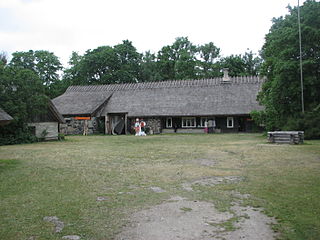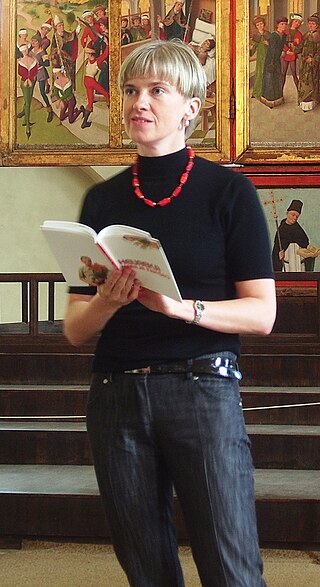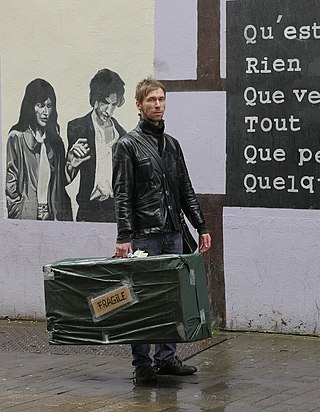
Juhan Smuul was an Estonian writer. Until 1954 he used the given name Johannes Schmuul. Smuul was one of the most recognized writers in Soviet Estonia and was a member of the Central Committee of the Communist Party of Estonia, a deputy of the Supreme Soviet of the USSR and the Supreme Soviet of the Estonian SSR, chairman of the Estonian Writers' Union, secretary of the board of the Union of Soviet Writers.
Estonian literature is literature written in the Estonian language The domination of Estonia after the Northern Crusades, from the 13th century to 1918 by Germany, Sweden, and Russia resulted in few early written literary works in the Estonian language. The oldest records of written Estonian date from the 13th century. Originates Livoniae in Chronicle of Henry of Livonia contains Estonian place names, words and fragments of sentences. The Liber Census Daniae (1241) contains Estonian place and family names. The earliest extant samples of connected Estonian are the so-called Kullamaa prayers dating from 1524 and 1528. The first known printed book is a bilingual German-Estonian translation of the Lutheran catechism by S.Wanradt and J. Koell (1535). For the use of priests an Estonian grammar was printed in German in 1637. The New Testament was translated into southern Estonian in 1686. The two dialects were united by Anton Thor Helle in a form based on northern Estonian. Writings in Estonian became more significant in the 19th century during the Estophile Enlightenment Period (1750–1840).
The Estonian Writers Union, is a professional association of Estonian writers and literary critics.

Maarja Kangro is an Estonian poet, short story writer, novelist, essayist, nonfiction writer and librettist.
Ellakvere is a village in Jõgeva Parish, Jõgeva County in eastern Estonia. The village is known for the garlic grown there.
Valter Heuer was an Estonian writer and chess player, who won the Estonian Chess Championship. He was awarded the Soviet Master title in 1960.

Robert Kurvitz is an Estonian novelist, video game designer, and musician. He was the lead designer of the 2019 video game Disco Elysium as a founding member of the ZA/UM cultural association and the eponymous video game development company that grew out of it. Kurvitz was fired from ZA/UM in 2022, alongside Disco Elysium's Lead Art Director Aleksander Rostov, after the majority stake in ZA/UM was acquired by Estonian businessmen Ilmar Kompus and Tőnis Havel.
Iko Maran was an Estonian playwright and children's book author.

Debora Vaarandi was an Estonian writer, considered to be a leading literary figure in post-World War II Estonia. Many of her poems were set to music. Vaarandi was a recipient of the first Juhan Liiv Poetry Award, and was recognized with the Cultural Award of the Republic of Estonia for outstanding lifetime achievement.

Ellen Niit was an Estonian children's writer, poet and translator. Over her lifetime, she penned more than forty books of both prose and poetry for children. She also wrote a number of collections of prose and poetry for adults. Her works have been translated into eighteen languages.

Anti Saar is a contemporary Estonian children’s writer and translator.
Cultural Endowment of Estonia is an Estonian foundation which supports activities related to Estonian culture. The foundation was established in 1925 and re-established in 1994.

Mudlum is an Estonian writer and literary critic.
Rein Saluri is an Estonian writer and playwright.
Empty is a 2006 Estonian drama film directed by Veiko Õunpuu and based on the Mati Unt's same-named story.
Ita Saks was an Estonian translator and publicist. She is mainly known by her Latvian-language translations to Estonian language.
Jüri Tuulik was an Estonian writer and playwright.
Asta Põldmäe is an Estonian writer and translator.
Endel Nirk was an Estonian literary scientist, critic and writer.

Helga Nõu is an Estonian writer, best known for her novels Kass sööb rohtu (1965), Tiiger, tiiger (1969), and Pea suu! (1983). She was invested with the Order of the White Star in 2001. Her husband is writer and medical researcher Enn Nõu.







